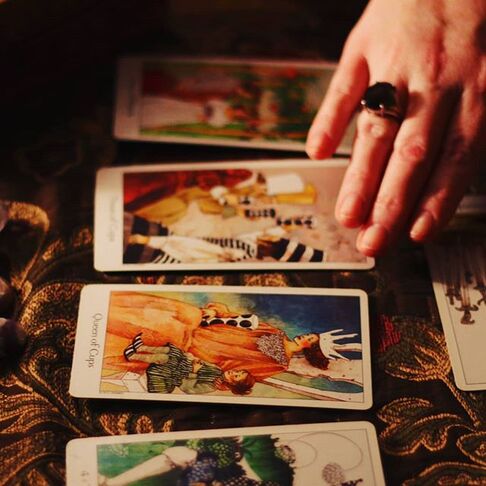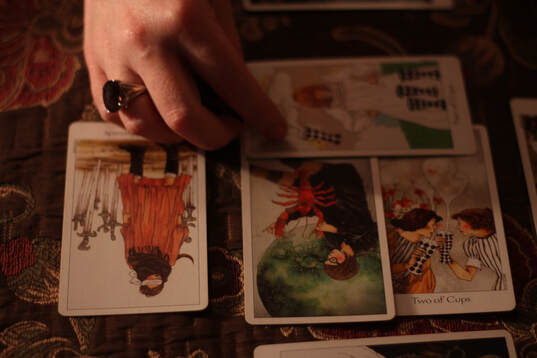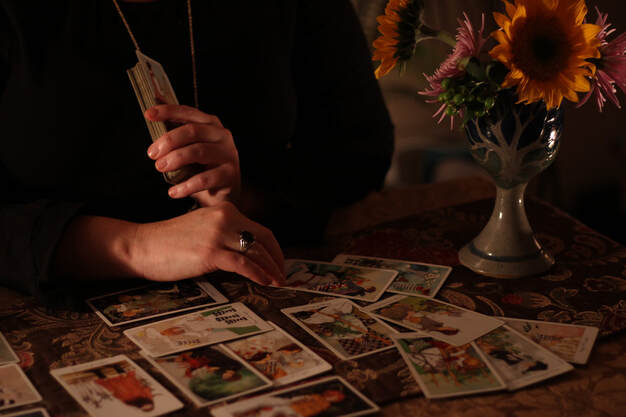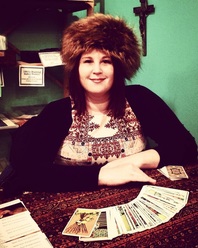|
In my practice I work a little differently than other readers. Many readers start out with a general reading. Starting with a general question is a good technique as it allows you to build rapport and trust with someone. They get to see how good you are without revealing anything. However, I work the opposite way. I ask for specific questions then will often finish with a general overview reading. Most people get readings when there is something specific that is bothering them. My approach with problem-oriented readings is for efficiency; I want to give as much information as possible within the time we have together. At first, and especially with first time clients, they might feel uneasy about giving me info, thinking that giving me leading information will sway the reading in some way. But honestly, I am asking questions to get to the “knot” of an issue, the thing that all the other things reside upon and when we get there everything else usually falls into place. I am, if anything, direct. This is a style difference within readers in the tarot community. Some start with a basic and move in, and others work to get to questions, first. Honestly, I think both techniques are good if the reader is good. As an example, a session with me might begin like this: “So what brings you in today?” I ask. “Oh, just stuff.” they might say. “Oh yeah? What kind of stuff?” I ask, leaning in. “Oh about my love life” they say with a sigh. “Hmm… okay, that is a topic. How about a question?” I request. “Well…just… how my love life is going to go.” they might respond. I ask more relevant details, “By ‘how my love life is going to go’ are you asking whether you are single and someone new is coming? Or, there is someone in your life currently that you are unsure about? Or, maybe you are in a complicated situation and want to know whether you two will be able to leave your current relationships for one another?” I ask, ticking off the basics. Finally we get somewhere and it is at this point where I get enough to construct a solid question for a reading. “Yeah, well, I have been seeing this guy on and off for about a year. I want to know whether I am wasting my time or not.” they say. Ahh…now we are getting somewhere! I have a friend who is a resource librarian, and one day she was venting (just a little) about how hard it is to get people to be specific about what they need. Just like me, she has to tick off question after question to get to the true problem or desire. I was surprised by this because I thought that since she doesn’t deal with the world of psychics, that her folks would be forthcoming I asked her to give me a sample of a typical reference related search query and it went something like this: “Hi, I am looking for information on marine biology” says a student to a reference librarian. “Great! What exactly are you looking for regarding marine biology?” a reference librarian will follow up. “Well… I am looking for information on crustaceans.” says the student. “Cool, are you looking for crabs, lobsters, ecology, biology…what exactly is it about crustaceans that you would like to know” (I am imagining my friend saying this with a smile.) “Oh, um, I need to research the effects of ocean acidification on blue crab shells.” they say in a rush. “Ahh. I know exactly where to point you!” says my friend. I had unintentionally stumbled upon a facet of human psychology. Perhaps a person doesn’t believe the professional can actually give them exactly what they are looking for, or they don’t want to waste the professionals’ time so they endeavour to glean what they need from the general information they will get regarding their general topic or question. Basically, we hedge our bets when we ask something. After a cursory Google search I found that this was indeed a recurring issue that resource librarians deal with: “The staff member may ask you a number of questions. This is so he or she can identify what you need. Sometimes researchers don’t ask for what they really want, so they are sent to sources that don’t answer their questions. They then feel frustrated or wonder if the staff member gave them decent help, when there was a miscommunication between the researcher and the staff member. For instance, telling the staff member that you “want a book about horses” is not asking a specific reference question when what you want to know is which horse won the Kentucky Derby in 1974. There are books on horses that cover racing, breeding, selling, riding, training, etc., so unless you want ALL possible information available “about horses,” it is much better to be very specific about what you REALLY want.” When I ask pointed questions, it helps me truly understand what issues are at hand. Rather than just jumping to a conclusion about what you need, I ask questions and confirm so I am absolutely sure. I really like the example this librarian shares: “After living in her house for about a year, a woman came up to the reference desk to tell me she was convinced it was haunted by the spirit of a person who’d died in it years ago. It was an old house, and she was sure that the person needed some kind of “closure” for her life and was asking her, as the current owner, to help her find it. At first, I thought this was a question about how to communicate with the spirits or how to cleanse one’s home of spiritual beings. But it turns out that wasn’t what she wanted. She felt comfortable doing that on her own or finding those resources. What she wanted was to know who the former occupants of the home were, perhaps those from the late 1800s or early 1900s.” This librarian asked for specific information, and dumped any knee jerk conclusions about what she thought the person wanted in order to really hear what the person needed. These are the exact same skills of a great tarot reader. Often, clients are unable to come to a specific question. So immersed in a complex situation they are unable to see their way to the essential knot of the issue at hand. I find it part of my work to listen deeply to my client’s story and help them construct a question specific enough that will get to some really great information. And that is what I am here to do: provide clarity to things that feel muddled. When we can come to the precise question we are feeding tarot a data set that is clean, sharp, and unfettered. The answer often then is just as clear, sharp and unfettered. Finally, there is one more resource that I thought was just fantastic because it also applies to tarot readers. Tarot readings are only one part of the equation. There is also a lot of EQ (emotional intelligence) that goes into a session such as: Approachability — General questions are usually just to ‘test the waters’ to see how you work and helpful you might be. Interest-They are looking to see if they have your full attention and investment. Listening-Do you actively listen to what the client needs, or do you jump to conclusions? Interviewing-Follow up with questions to help narrow or focus the client towards what they actually need. Answering-Give your querent a clear answer and one that is actually tied to the question asked (This is a huge rookie mistake I see all the time. Trust that the cards have answered the question, don’t go off on a tangent.) Follow up-Ask questions to ensure that you have given them what they came looking for. Make sure that they are understanding the information I guess I am a cosmic resource librarian. I don’t use the Dewey decimal system, but I have 78 cards to do the trick!
If you are a reader who needs concrete questions in order to provide a great session, don’t fret! There are plenty of other professionals who need the same thing. It is okay to ask clarifying question, to help decode what is muddy, and honestly? To not feel inadequate because you can’t read someone’s mind and instantly glean what they want, how they want it, and where they want it done! The magic of tarot is robust. You are not killing its secret sauce by being logical at the outset. Creating a tight contextual frame of reference quiets ambiguity and honestly helps granular, pesky little problems.
4 Comments
3/5/2020 09:56:42 am
Absolutely! I do the same thing, mainly when doing 15 min sessions. If they are only paying for 15 min, I need to get their question answered quickly or they waste all their time "proving" the connection. I always ask for a question first. If they are still hesitant, I ask for an area of interest to hone in on.
Reply
Beth C
7/16/2020 01:13:31 pm
Being a librarian myself, I found this article extremely useful. An excellent comparison!
Reply
Linda Harley
1/26/2023 08:53:51 pm
Interesting article and I can't help notice the beautiful large amethyst you are wearing. Is that your hand in the photo?
Reply
Your comment will be posted after it is approved.
Leave a Reply. |
Details
Subscribe below to get my daily blog posts right in your email!
Jenna Matlin
M.S. in Organizational Psychology and Leadership Categories
All
|



 RSS Feed
RSS Feed
